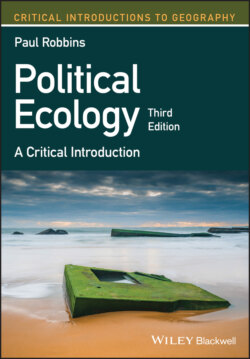Читать книгу Political Ecology - Paul Robbins - Страница 22
Big questions and theses
ОглавлениеWhat unites the diverse work in these many locations is a general interest in five big themes. Over‐simply, political ecology research has demonstrated (or attempted to demonstrate) the theses shown in Table 1.3, each of which receives a chapter later in this book.
Table 1.3 Five theses of political ecology and the things they attempt to explain.
| Thesis | What is explained? | Relevance |
| Degradation and marginalization | Environmental conditions (especially degradation) and the reasons for their change | Environmental degradation, long blamed on marginal people, is shown in its larger political and economic context. |
| Conservation and control | Conservation outcomes (especially failures) | Usually viewed as benign, efforts at environmental conservation are shown to have pernicious effects, and sometimes fail as a result. |
| Environmental conflict and exclusion | Access to the environment and conflicts over exclusion from it (especially natural resources) | Environmental conflicts are shown to be part of larger gendered, classed, and raced struggles and vice versa. |
| Environmental subjects and identity | Identities of people and social groups (especially new or emerging ones) | Political identities and social struggles are shown to be linked to basic issues of livelihood and environmental activity. |
| Political objects and actors | Socio‐political conditions (especially deeply structured ones) | Political and economic systems are shown to be underpinned and affected by the non‐human actors with which they are intertwined. |
